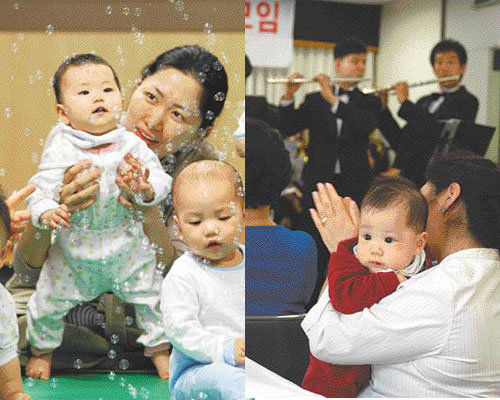Respond to Babies Babble and Smiles

Babies develop attachment to their mothers until they are one or two years of age. A stable relationship with their mother at that age will influence them for life. In order for them to develop a stable attachment, mothers should immediately respond to their cries, hug them and give a loving touch to them when they babble.
When infants reach around eight months old, they are afraid of strangers, which is deemed quite natural. If they show no signs of anxiety at strangers, that means they dont regard their mothers as important to them. Oftentimes, we see mothers who make their babies watch English video tapes repeatedly in an effort to give them early English education. But that effort backfires since it hinders their brain development and attachment formation. What is most important for mothers to do in this period is giving appropriate responses to babies and playing with them. These interactions are major factors for the development of their intelligence, language, and social skills.
Babies of ages between one and a half years and three years are called toddlers. They are toddling around and show their curiosity in everything, touching and closely looking at what they encounter. Babies in this period start to distinguish what is good or bad, assert themselves and also control themselves. When toilet training is carried out in a coercive manner, they feel shame and anger.
Toddlers are recalcitrant, but when they become two years of age, they should be disciplined and taught what is allowed and not allowed.
Before they become three years old, babies exhibit separation anxiety when their mothers leave them. They are distressed because, for them, out of sight means gone forever. Toddlers also have strong attachment to specific objects, which they consider substitutes for their mom.
Prime examples are sucking fingers and sticking to blankets. Babies suck fingers when they fall asleep to feel the warmth of mother, and they feel psychologically secure when they are wrapped in a blanket they always use.
Babies are born with their own personal traits. They react and make relationships with others in their own way. So their traits can be identified when they are young.
Some children tend to be easily irritated, giving their mothers hard lives. On the other hand, some children have such a gentle nature that their mothers hardly have any difficulty in raising them. All the differences come from their dispositions.
That doesnt mean parents have no role in influencing their children, however. Depending on upbringing and the environment children are in, their personalities can change. When a good upbringing works together with a childrens disposition, their innate traits can develop positively.
Children with a propensity for stimuli are highly likely to have high curiosity for everything, be attracted to new things, and experience the world by challenging it. Boring and repetitive acts dont work for these children. What is needed for them is a different approach that helps them grow to be enthusiastic and creative adults.







